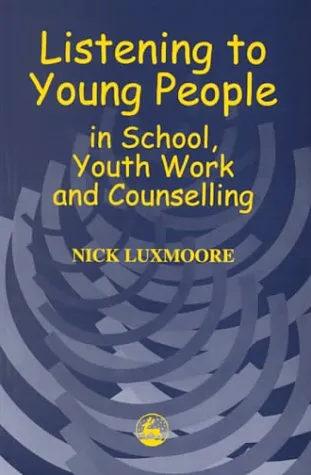Listening to Young People in School, Youth Work and Counselling
4.5
Reviews from our users

You Can Ask your questions from this book's AI after Login
Each download or ask from book AI costs 2 points. To earn more free points, please visit the Points Guide Page and complete some valuable actions.Introduction to "Listening to Young People in School, Youth Work and Counselling"
Communication lies at the very core of how individuals connect, grow, and thrive—and this truth is especially critical in our relationships with young people. In my book, "Listening to Young People in School, Youth Work and Counselling," I explore the art and importance of listening as a means of building trusting relationships with young people in schools, youth work settings, and counselling environments. This book is not just about hearing; it’s about understanding, valuing, and empowering young voices in a world increasingly fraught with challenges and distractions.
Listening is a profoundly active process, intertwined with empathy, patience, and genuine curiosity. Adolescents, navigating the turbulent waters of identity, relationships, and societal expectations, often struggle to feel truly heard in traditional adult-led environments. This book delves deeply into how adults—educators, youth workers, counsellors, and other professionals—can foster meaningful connections with young people through authentic listening practices. By recognizing their emotions, struggles, and aspirations, we encourage young people to trust not only us but also in their capacity to overcome challenges.
Detailed Summary of the Book
"Listening to Young People in School, Youth Work and Counselling" examines the complexities of creating spaces where young people truly feel seen and heard. The book begins by exploring the significance of listening, debunking myths about communication, and emphasizing the role of genuine curiosity in establishing rapport. It challenges adult-centric perspectives and stresses the importance of respecting the unique experiences of young people.
The chapters focus on real-world contexts, including school classrooms, one-to-one counselling sessions, and group settings in youth work. Here, I provide practical techniques for listening—such as asking open-ended questions, managing difficult emotions, and navigating power dynamics. A key emphasis is placed on how adults can create a safe, non-judgmental environment while maintaining professional boundaries.
Moreover, the book addresses the challenges faced by professionals, such as dealing with resistance, managing miscommunications, and handling moments when young people may not want to talk. With relatable anecdotes, insightful reflections, and guidance rooted in experience, the book underscores listening as a purposeful practice that builds resilience in the young people we work with.
Key Takeaways
- Listening is an active, intentional process that requires full presence and attention.
- Young people value authentic connections over adult authority or expertise.
- Effective listening can help young people make sense of their own feelings and experiences.
- Building trust is essential—and often takes time—but it is the foundation for meaningful dialogue.
- Professionals must reflect on their own biases, assumptions, and listening habits to truly connect with young people.
- The act of being heard can significantly empower a young person and foster personal growth.
Famous Quotes from the Book
“Listening isn’t just about hearing words—it’s about creating space for someone to express who they are.”
“The most powerful thing you can say to a young person is: I hear you. I see you. I believe you.”
“To truly listen to young people, we must be willing to suspend our judgments and assumptions and enter their world with empathy.”
Why This Book Matters
In a world where young people often feel alienated, misunderstood, or overlooked, "Listening to Young People in School, Youth Work and Counselling" offers a timely reminder of the transformative power of listening. It provides actionable insights for busy professionals while addressing the ethical and emotional dimensions of their work. This book challenges traditional approaches that prioritize adult authority and instead makes a compelling case for empowerment through empathy.
Whether you are a teacher managing a busy classroom, a youth worker striving to support a group of adolescents, or a counsellor guiding a young person through sensitive issues, this book equips you with the tools and mindset necessary to create a meaningful impact. It highlights that listening is not just about fixing problems or doling out advice. It’s about creating connections that allow young people to feel valued, capable, and resilient.
By learning to listen more effectively, we can all contribute to a world where young voices are not just heard but truly respected and cherished.
Free Direct Download
Get Free Access to Download this and other Thousands of Books (Join Now)
For read this book you need PDF Reader Software like Foxit Reader


